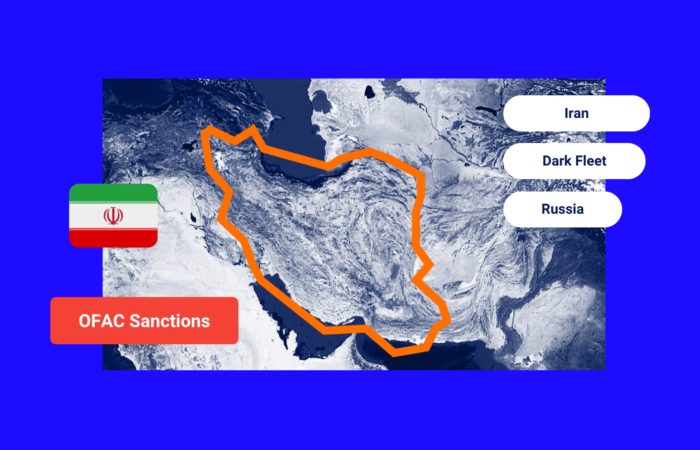Largest Iranian Shipping Network Sanctioned in Sweeping OFAC Crackdown

What’s inside?
Sweeping U.S. sanctions imposed on Iran’s oil and shipping network on July 30 are the most extensive since 2018 and focus on the shipping empire controlled by Mohammad Hossein Shamkhani, widely known in trading circles as “Hector”.
The Office of Foreign Asset Control package added 62 vessels to the sanctions list for shipping Iranian oil, gas, missiles, drone components and dual-use goods, along with 12 individuals and over 70 ship management and front companies worldwide.
Breakdown of the Sanctioned Fleet
Of the 62 vessels:
• 89% were flagged as high-risk by Windward’s Maritime AI™ Platform prior to their designation, mainly due to GNSS manipulation, port calls in sanctioned regimes, dark activity, and suspicious cargo on board
• Only 5% were previously sanctioned by other regulators
• 55% were previously flagged as part of the dark fleet
Ships included:
• 21 containerships
• Three liquefied petroleum gas carriers
• One patrol vessel
• 37 tankers.
37% of all vessels were flagged in Liberia, the world’s largest flag registry, and 26% in Panama, the second largest.
Yesterday’s action brings the total to nearly 170 ships designated by the Trump administration, all linked to Iran’s oil and shipping networks or Iran-backed Houthis.
This also marks the first time a fleet of containerships has been linked, with OFAC outlining their role in cargo operations involving the exchange of missiles, drone components, and dual-use goods for Russian petroleum.

Russia-Iran Shipping Ties Revealed
Although the government has yet to issue any Russia-related sanctions, the federation’s shipping ties with Iran were clearly drawn by OFAC in this package and supported by vessel behavior.
Compliance risk was linked to Russia for 33 of the sanctioned vessels, including nine containerships.
Furthermore, OFAC said Hossein not only purchased Russian oil for resale but was revealed to be behind a prominent fleet of some 25 sanctions-evading Russia-trading tankers, and owned ships that provided materiel logistics support to Russia.
Fractal Marine and Network of Shell Companies Exposed
Shamkhani’s tanker network was centred around Fractal Marine DMCC, a United Emirates-based operator managing a fleet of at least 30 Russia-trading tankers. The UK sanctioned Fractal Marine in February 2024
Fractal Marine subsequently fragmented into entities including Zulu Ships Management and Operation and Swiss-based Progwin Shipping SA, all of which were designated in yesterday’s action, along with other shipmanagers in the UAE and Turkey that took over vessel management.
Progwin and former Fractal Marine drew “public attention for the unusual speed at which it assembled an expansive fleet of aging tankers” in early 2023, according to OFAC.

Maritime Agents Sanctioned for First Time
For the first time, yesterday’s designation saw the Trump administration target maritime agents involved in incorporating and paying fees for front companies created for Hossein’s network.
Maritime agents are an arcane and often overlooked part of the shipping industry’s architecture. Typically employed by shipowners to manage incorporation and related services, they establish companies in favorable jurisdictions and coordinate flagging, classification, and insurance. These agents create layers of separation between the beneficial owner and the vessel, helping to manage liability and obscure true ownership.
UAE-based GMCG Shipping LLC and Cyprus-based GMCG Ltd are the maritime agents sanctioned.
US State Department Supporting Action
Coinciding with OFAC, the US State Department designated five vessel management companies, a petroleum wholesale company and 13 companies for their involvement in transporting and buying and selling Iranian oil.
Eight ‘dark fleet’ tankers were named as blocked property in which one of the managers, Eithad Engineering & Marine Services FZC had an interest.
A fourth crude oil and petroleum products terminal in China, Zhoushan Jinrun, was designated for receiving multiple cargos from Iran.
Global Reach and Deepening Compliance Risks
OFAC said these layers of front companies “with an innocuous appearance and no easily discernible connection to Hossein’s network allow it to accrue enormous profits while avoiding outside scrutiny.”
Sanctioned companies operated in major maritime and trading hubs — including the UAE, Singapore, Hong Kong, Cyprus, Switzerland, and Turkey — highlighting the ongoing compliance challenges facing the broader shipping industry.
The action represents a significant escalation in U.S. efforts to disrupt illicit maritime trade and signals increased scrutiny of enablers throughout the global shipping supply chain.










